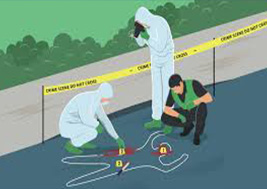Forensic Psychology
Forensic psychology is the interaction of the practice or study of psychology and the law. Psychologists interested in this line of applied work may be found working in prisons, jails, rehabilitation centers, police departments, law firms, schools, government agencies, or in private practice etc. Forensic psychology involves applying psychology to the field of criminal investigation and the law. Forensic psychologists are often involved in both criminal and civil matters such as civil lawsuits, custody disputes, and insurance claims. When forensic psychologists work in family courts, they offer psychotherapy services, investigate reports of child abuse, perform child custody evaluations, and conduct visitation risk assessments. The forensic psychologists that work in the civil courts provide psychotherapy to crime victims, assess competency, and provide second opinions. Those working in the criminal courts provide an assessment of juvenile and adult offenders, conduct evaluations of mental competency, and work with child witnesses.
Forensic psychologists will often conduct their own research, as well as study and analyze research from other professionals. They may study criminals and their crimes to figure out what traits certain types of criminals have, which may involve interviewing criminals along with their loved ones and victims.Forensic psychologists may also act as expert witnesses during criminal trials, and give testimonies about why a crime may have occurred. They may also express why they believe a defendant was likely to have committed the crimes in question. A forensic psychologist might also have an influence on a criminal's sentencing.










.jpg)





















